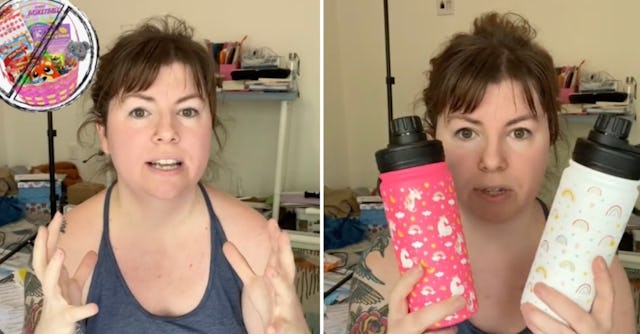A Mom's "Low-Clutter" Easter Basket Ideas Are Completely Ingenious
No more useless plastic crap.

Easter is almost here! Have you even started to figure out what to put in your kid’s Easter basket? These days, it seems that Easter baskets have gotten a little out of control.
Take a scroll on TikTok or Instagram, and you’ll be bombarded with influencers sharing their kids’ baskets, spilling over with expensive gifts like jewelry, gift cards, and gaming systems.
If a luxury basket isn’t your style, big box stores have plenty of egg fillers, Easter-themed toys, and tons of plastic junk to have your kid’s basket overflowing — but is that really the best route to take?
Popular TikToker KC Davis (@domesticblisters) has a brilliant idea for the parents out there who want their kids to have a great Easter basket but don’t want all the junk that typically comes along with it. She calls it a “low-clutter” Easter basket.
It’s for every parent who loves to spoil their kids around the holidays but also don’t want a bunch of junk that’s just going to accumulate around the house and stress you out once the day is over.
Davis — author of How To Keep House While Drowning and host of the Struggle Care podcast — is a licensed professional therapist who helps those dealing with mental health, physical illness, and hard seasons of life find a practical approach to self and home care.
“Hello, I'm a mom and I have made it my mission this year to have low clutter Easter baskets,” Davis begins. “Because I am someone who loves to go overboard with Easter baskets and I'm also someone who hates the huge amount of like little plastic and extra toys that often get included in big Easter baskets.”
Instead of plastic eggs, bunny ears, and other small plastic toys that will either end up in the garbage or in a pile of clutter, she opts for things that her kids need replaced like a new box of crayons, water bottles, and swimsuits. This way, she’s not adding anything else to the household inventory — she’s just adding replacement items. Two birds with one stone!
Next, she adds some edible items to the basket. “They both get a chocolate bunny. And my kids always ask to make cake. So, there'll be cake mix and icing, and these little decoration thingies and these sprinkles, these will be in their Easter basket,” she explains while showcasing the items.
“I'll be so excited because they'll see it and they'll go, ‘Oh my God, it means we're making a cake today.’”
The idea here is genius and so simple — the cake mix items will fill up the kids’ baskets and will be gone the same day.
The last items Davis puts in the basket are fun components to the basket that have the ability to be “used up” by her kids. This way, she’s checking that box of most kids wanting toys in their basket, but they are also items that will be used up and then quickly thrown away.
She includes sidewalk chalk in the shape of eggs, bubbles, and stamps.
“This will be so fun for four days, and then it'll be out of my house forever,” she says.
The average American household has over 300,000 items in it and with holidays like Christmas and Easter, there is just no end in sight to the amount of crap we’re bringing into our houses. $1.2 trillion a year are spent on non-essential goods, and the home organization industry has boomed in the last two years.
Research shows that all that clutter and all those “things” are actually making us miserable.
According to Psychology Today, clutter overstimulates our visual, olfactory, and tactile systems, exhausting our senses making it extremely difficult to relax. We’re constantly being reminding our to-do lists which creates anxiety because the idea of sorting and organizing our stuff becomes overwhelming.
Scientists have even found a link between an overabundance of household items and how it affects a woman’s long-term well being more than it does a man’s.
“When we have too many possessions, they can become clutter, and we've shown that that has an impact on home,” one of the authors of the study, Joseph R. Ferrari said.
“Clutter gets in the way of relationships. Things, not people, become what matters in life, but relationships are what provide us with a sense of community. We identify with our possessions, but when home is plagued by clutter, it gets corrupted in a very harmful way. Most people think of home positively, but we're showing the negative side, the dark side.”
Davis’ “no clutter, low clutter” approach to Easter baskets is the perfect compromise for parents who still want to keep that Easter magic intact but also don’t want the mental and physical clutter of new items gathering in the house.